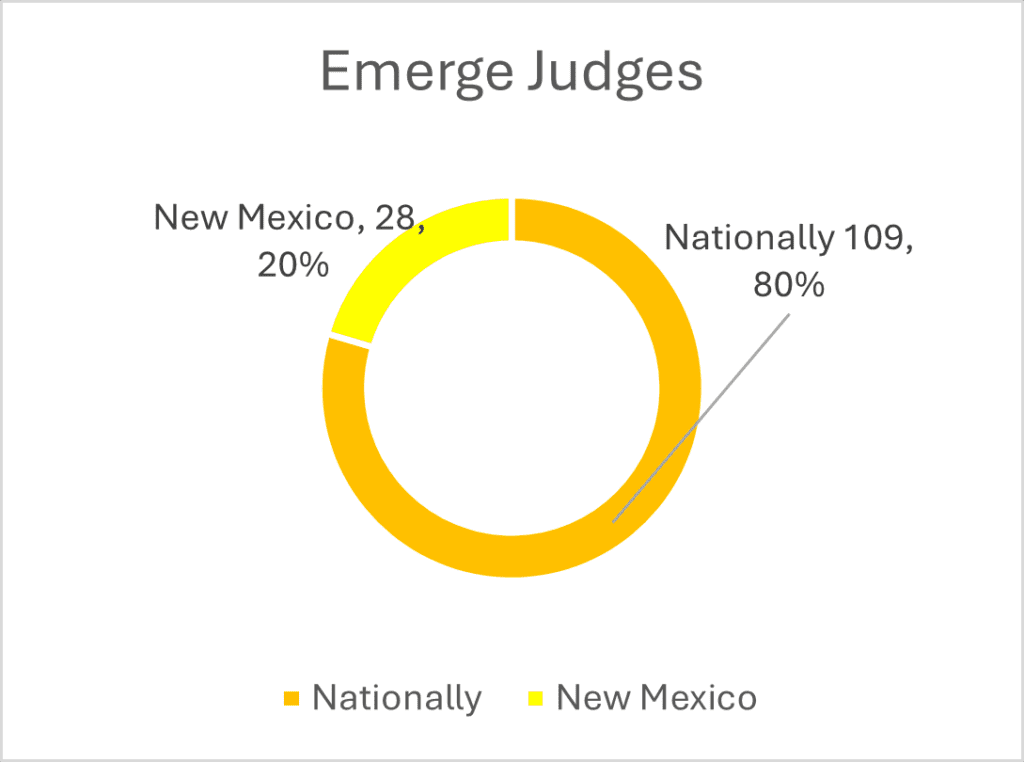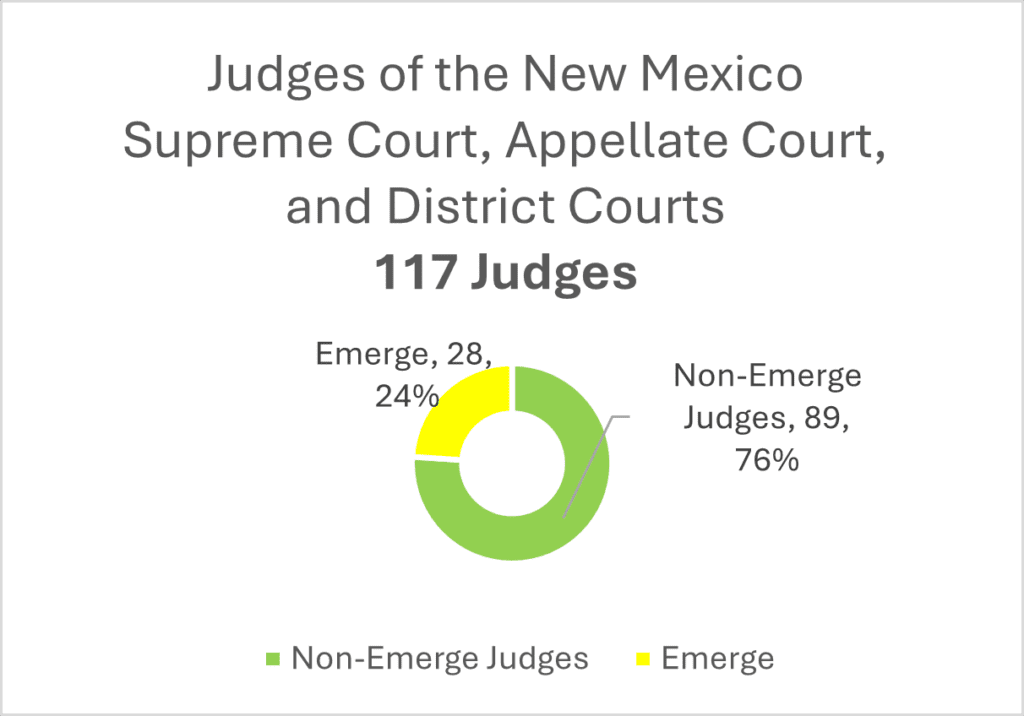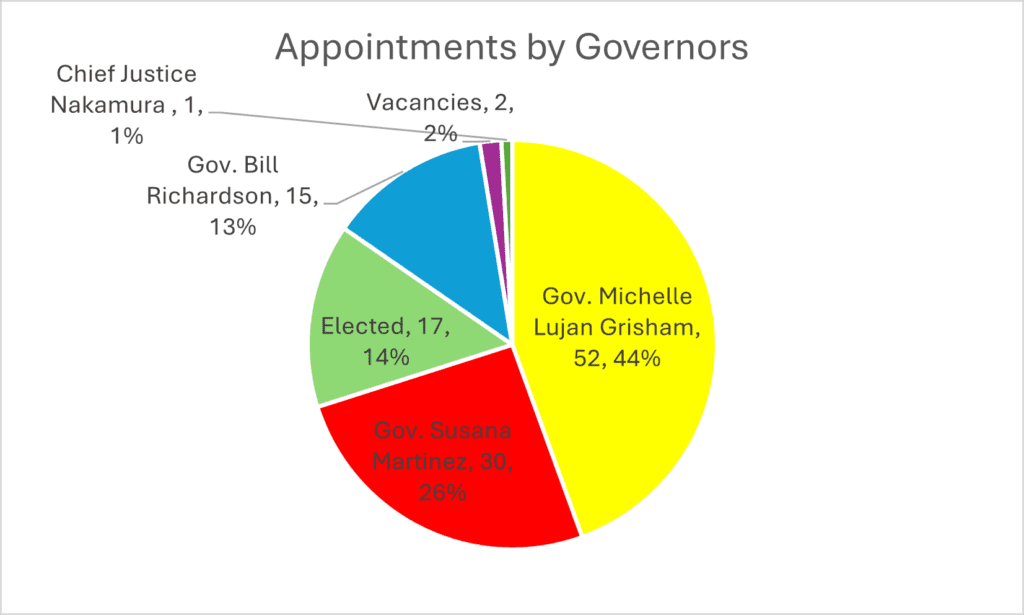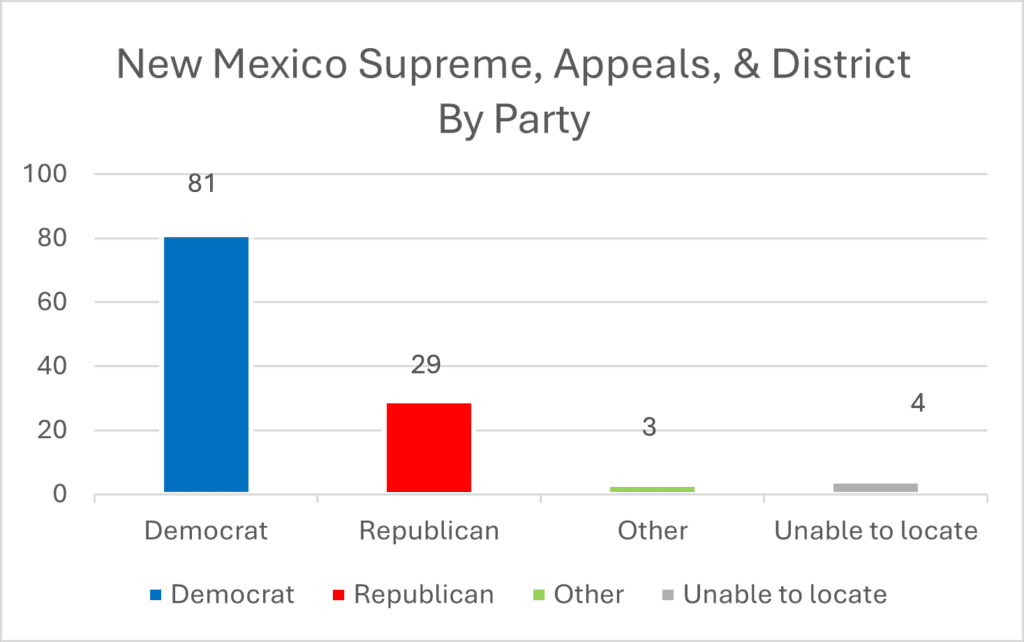From the Bench to the Ballot: Emerge’s Influence on Politicizing the Judiciary in New Mexico
Part 2 of this series discussed how the courts were intended to work in our constitutional republic. The separation of powers was designed to ensure no single branch exceeds its mandate. The legislature makes laws, the executive enforces them, and the judiciary checks their constitutionality and the actions of other branches. This balance is crucial, and the judiciary must remain free from overt political biases to function effectively. This balance was reaffirmed in a US Supreme Court ruling last Friday, Loper Bright Enterprises vs. Raimondo.
New Mexico now has the dubious honor of being the most dangerous state to live in according to Forbes Advisor. New Mexico’s violent crime rate per 1,000 residents is now 7.80 and the property crime rate per 1,000 residents is a staggering 29.84. This means your chance of becoming a victim of violent crime in New Mexico is now 1 in 128.
The Judiciary’s Role in Rising Crime
The cause of rising crime is multifaceted, but the criminal justice system is certainly a significant factor. The criminal justice system begins with law enforcement officers, who are being impeded by radical politicians who have been calling for their departments to be “defunded” and have successfully removed qualified immunity for officers when they are acting in their official capacity.
A practice dubbed – “catch and release”- was part of part of the Criminal Justice Reform that passed in 2016 as a constitutional amendment. It eliminated cash bail for certain populations and gave judges more power to decide if a defendant is a danger or flight risk instead of a fixed monetary bond schedule. These pre-trial decisions are based on the judges “opinion” and there has been continued controversy over the practice. At least two District Courts have been ordered by the Supreme Court to change their case management system, which has the potential to force the judicial system to drop hundreds of criminal cases.
Not only is law enforcement being restricted from prosecuting crimes, but outside forces are actively attempting to stack the judiciary to support progressive political causes from the bench.
Emerge’s Influence
During their annual luncheon held in San Francisco in April of this year, far-left political organizations “Emerge New Mexico” and “Emerge America” took credit for “flipping” New Mexico from “red to blue” – a performance they are attempting to achieve nationwide by 2045 with the creation of what they call the “New American Majority.”
In general terms, Emerge accomplishes their goals by training candidates in far-leftist ideology and then assisting them in their campaigns to attain office in exchange for their pledge to support the Democrat platform. That may not sound out of the ordinary in the political world if the offices Emerge was attempting to influence were relegated to elected offices which are explicitly political – like legislators and local boards. But Emerge is explicit about their attempt to transform the judiciary into an office that creates policy instead of one that applies the law through their “Gavel in Program.”
Their president, A’shanti F. Gholar, stated there were 109 judges nationwide who are Emerge Alumni in their “Gavel In Program”. This program aims to change the decision-makers to achieve criminal justice reform. She states, “that is the world we are building through our Gavel in Program.”


New Mexico was part of the inaugural cohort for Emerge’s “Gavel in Program” and holds 20 percent of the total Emerge “Gavel-In” judges nationwide. These 28 Emerge Judges hold seats on the New Mexico Supreme Court, Appeals Court, and District Courts.
Emerge alumni account for two out of five Supreme Court Justices, seven of ten Appeals Court Judges, two out of ten judges in the First Judicial District (Santa Fe, Los Alamos, and Rio Arriba Counties), and fifteen of thirty judges in the Second Judicial District (Bernalillo County).
Judges’ Political Affiliations
The names of these judges can be found on the Emerge NM website under Alumni. Here is the list of the higher court judges:
| New Mexico Supreme Court | Emerge Class | Court Term Expires |
| Judge Julie Vargas | 2014 | 12/31/2028 |
| Judge C. Shannon Bacon | NM Founding Board | 12/31/2026 |
| New Mexico Court of Appeals | Emerge Class | Court Term Expires |
| Judge Jennifer Attrep | 2015 | 12/31/2024 |
| Judge Kristina Borgardus | 2017 | 12/31/2026 |
| Judge Jacqueline R. Medina | 2014 | 12/31/2028 |
| Judge Megan P. Duffy | 2018 | 12/31/2024 |
| Judge Shammara Haley Henderson | 2010 | 12/31/2024 |
| Judge Jane B. Yohalem | 2018 | 12/31/2030 |
| Judge Katherine Anne Wray | 2022 | 12/31/2030 |
| First Judicial District (Los Alamos, Rio Arriba & Santa Fe) | Emerge Class | Court Term Expires |
| Judge Maria Sanchez-Gagne | 2016 | 12/31/2028 |
| Judge Kathleen McGarry Ellenwood | 2020 | 12/31/2026 |
| Second Judicial District (Bernalillo) | Emerge Class | Court Term Expires |
| Judge Beatrice J. Brickhouse | 2010 | 12/31/2026 |
| Judge Nancy J. Franchini | 2014 | 12/31/2028 |
| Judge Alma C. Roberson | 2021 | 12/31/2026 |
| Judge Catherine Begaye | 2014 | 12/31/2028 |
| Judge Elaine P. Lujan | 2020 | 12/31/2024 |
| Judge Lisa Chavez Ortega | 2020 | 12/31/2026 |
| Judge Marie Ward | 2006 | 12/31/2028 |
| Judge Courtney Weeks | 2013 | 12/31/2024 |
| Judge Erin B. O’Connell | 2019 | 12/31/2028 |
| Judge Diana Garcia | 2023 | 12/31/2026 |
| Judge Britt M. Baca-Miller | 2021 | 12/31/2028 |
| Judge Amber Chavez Baker | 2019 | 12/31/2026 |
| Judge Debra Ramirez | 2015 | 12/31/2024 |
| Judge Jane Levy | 2017 | 12/31/2026 |
| Judge Clara Moran | 2010 | 12/31/2026 |
| Third Judicial District (Dona Ana) | Emerge Class | Court Term Expires |
| Judge Rebecca C. Duffin | 2022 | 12/31/2026 |
| Thirteenth Judicial District (Cibola, Sandoval &Valencia) | Emerge Class | Court Term Expires |
| Judge Amanda Sanchez Villalobos | 2019 | 12/31/2026 |
This list does not include all the Emerge Alumni that are currently on the bench. For instance there are 3 Judges on the Bernalillo Metropolitan Court that are Emerge Alumni. There are also Alumni not listed that are magistrate and probate judges.
The Emergence of Politics on New Mexico Benches
There are several ways that judges attain their positions, depending on the court. Judges can be appointed by the Governor, Chief Justice or elected. Typically, appointed judges must defend their seat at the ballot box when their appointed term expires.
We analyzed the 117 judges in New Mexico in the Supreme, Appellate and District Courts – 52 of them were originally appointed by Governor Michelle Lujan Grisham. There are 30 appointments remaining made by Republican Governor Susan Martinez’s administration – surprisingly, six of Martinez’s appointments were Emerge Alumni.

The public believes that judges will not let their personal political opinions influence their decisions in applying the law equally and ensuring the scales of justice are balanced. However, judicial activism and legislating from the bench are increasing, in conformance with Emerge’s stated goals.
This fact became particularly clear in 2020 during COVID when questionable judicial decisions were made to uphold unconstitutional mandates. Businesses were capriciously deemed “essential” or “non-essential” by Governor Michelle Lujan Grisham. The “essential” businesses, which included liquor stores, cannabis shops, and national corporate big box stores were allowed to stay open and rake in record profits. Religious freedoms were stifled as churches were deemed “non-essential.” Citizens who owned local businesses and restaurants were ordered to close, and New Mexico lost more small businesses and restaurants than any state in the nation as a result.
New Mexico courts upheld Grisham’s questionable and ineffective COVID policies, imposed crippling fines, unseated elected officials who resisted, and protected Grisham from liability for the untold damage her ineffective policies were causing. These same courts ignored Grisham’s unnecessary jewelry shopping trips and salon visits. Courts failed to address the constitutionality of these mandates, allowing the Governor and administrative state to impose restrictions without scientific evidence of their effectiveness.
The judicial system also failed to address questionable election rule changes in 2020 and dismissed evidence brought forth on election irregularities and the Secretary of State’s failure to provide an election system which complies with state and federal law. Additionally, the 2020 election saw significant changes, including increased mail-in ballots and the installation of millions of dollars’ worth of drop boxes financed by private partisan entities, further degrading the election process and the judiciary was silent.
Is this a result of judges who have signed an agreement to follow the Democratic Party platform as required by Emerge? Attempts to contact Emerge to find out if the Democrat Party platform was the only agreement required of the alumni of the “Gavel in Program” have not received a response.
Party Affiliation and Judicial Activism
Of the 117 judges analyzed, 81 are Democrats, 29 are Republicans, 3 are other. We were unable to locate the voter registration data on two of the judges and two positions are vacant. These statistics are astounding when you consider the political makeup of New Mexico. Registered Democrats account for only 43 percent of the state’s registered voters, yet 69 percent of the judges are Democrats. Conversely, Republicans account for 31 percent of registered voters, but only have 25 percent of the available benches.
In other words, Democrats only outpace Republicans by a margin of 12 percentage points in registrations, yet they have 44 percent more judicial seats. The heavy influence of Emerge graduates on the higher courts ensure that they will have enough influence to quickly overturn any ruling from a lower court that might be at odds with Emerge’s goals.

Conclusion
The influence of Emerge on the judiciary in New Mexico raises significant concerns about the integrity and impartiality of the judicial system. When political organizations exert such a profound influence on judicial appointments, the very foundation of the legal system—fair and unbiased justice—is at risk. The judiciary must be an independent arbiter, free from the influence of political ideologies, to ensure that justice is truly blind.
The alarming statistics on crime in New Mexico, combined with the judiciary’s failure to address the constitutionality of mandates and election rule changes, highlight the potential consequences of a biased judicial system. The judiciary’s role is to interpret the law and protect the rights of all citizens, but when judges are overtly aligned with political groups, their decisions can reflect partisan biases rather than impartial justice.
The presence of 28 Emerge Alumni on New Mexico’s highest benches, representing a sizable portion of the judiciary and underscores the extent of political influence. This affiliation raises questions about the judges’ ability to remain neutral, especially when they have signed agreements to support specific ideologies. The impact of such political alignment is evident in the questionable judicial decisions and the apparent double standards in rule enforcement during the pandemic.
The statistics provided in this article show a concerning imbalance in party affiliation among judges giving an extreme advantage to Democrats which is not supported by the actual makeup of the citizens of the state. This imbalance further fuels doubts about the judiciary’s ability to uphold balanced and unbiased justice.
The integrity of the judicial system is paramount. To restore public confidence, it is essential to scrutinize the processes of judicial appointments and ensure that judges are selected based on merit, not political allegiance. Transparency in these processes and a commitment to maintaining judicial independence are crucial steps toward achieving a fair and just legal system. Addressing these issues is imperative to preserve the foundational principles of the republic and ensure that justice is truly for all.
- Opinion | SB 218—New Mexico’s Promise Made, Promise Broken - February 24, 2025
- New Mexico’s Supreme Court Ignores Rights and Restricts Who Can Hear Election Cases - January 9, 2025
- Progressive Blueprint: How EMERGE’s Legislative Surge is Poised to Reshape New Mexico - January 6, 2025


